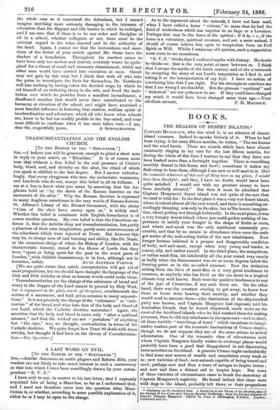TRANSUBSTANTIATION AND THE ENGLISH CHURCH.
[To THE EDITOR OF THE " SFECTATOR."] Sur,—I believe you will be generous enough to print a short note in reply to your article on "Ritualism." It is of course most true that without a firm belief in the real presence of Christ's body, blood, soul, and divinity on the altar, the ritual of which you speak is childish to the last degree. But I answer unhesita- tingly, that every clergyman who uses the eucharistic vestments, and hundreds who do not, accept this belief in all its fullness. I am at a loss to know what you mean by asserting that the An- glicans hold on "by the skirts of the Roman doctrine on the sacrament of the altar." Why the Roman doctrine is expressed in many Anglican catechisms in the very words of Roman doctors. St. Alfonso's Litany of the Blessed Sacrament, with the clause " Corn of the elect have mercy upon us," is widely used. Whether this belief is consistent with English formularies is of course another question. My own belief is that the Catechism en- forces it, that the Articles deny not transubstantiation, but partly a phantom of their own imagination, partly some misstatements of the schoolmen which were rejected at Trent. But however this may be, to charge men of vast learning and ability, like Dr. Neale, or the numerous clergy of whom the Bishop of London, with his characteristic honesty, stated in the House of Lords that they were "spent or being spent for the poor in the worst parts of London,' ;with childish inconsistency, is in fact, although not in [We are quite aware that subtle interpretation will get rid of most propositions, but we should have thought the language of the 28th and 29th Articles as clear as human words could make them. " Transubstantiation (or the change of the substance of bread and wine) in the Supper of the Lord cannot be proved by Holy Writ, but is repugnant to the plain words of Scripture, overthroweth the nature of a sacrament, and hath given occasion to many supersti- tions." Is it not precisely the change of the "substance" or " sub- tratum " of the bread and wine into that of the body and blood of our Lord, which the Catholic doctrine maintains ? Again, the assertion that the body and blood is eaten only " after a spiritual manner," and that the wicked are not " partakers" of anything but " the sign," was, we thought, contradiction in terms of the Catholic doctrine. We quite forget how Tract 90 dealt with these articles, but thought it had been on the theory of Consubstantia- tion.—En. Spectator.]






























 Previous page
Previous page